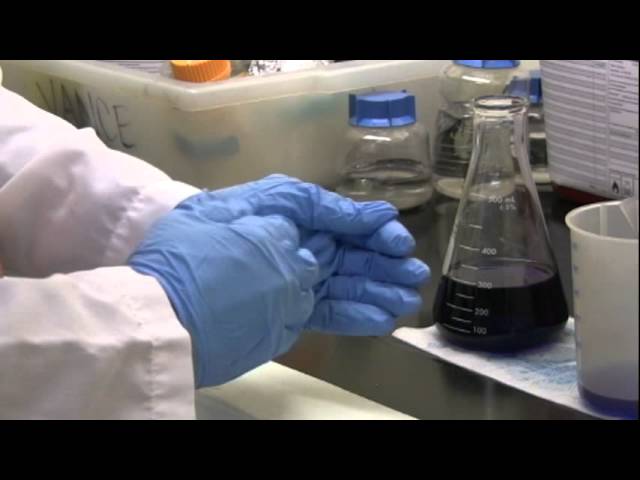Safety structure
- Pascal Jonkheijm and Mark Hempenius: Safety official
- Regine van der Hee: Responsible group member for Genetically Modified Organisms
Richard Egberink, Marcel de Bruine, Clemens Padberg and Christiaan Breukers are the people who have a first aid diploma. There is a plaster box in every lab. Dial 2222 in case of emergency.
Lab-check
The (bio)chemical work within Molmat Department is divided over 4 different laboratories.. Members of each of these laboratories are responsible for the order and cleanliness of their own lab, the general equipment (rotavaps, ovens, pumps, vacuum line, balances etc), the general fume hood (waste hood), cupboards etc. Everybody has to empty their own fume hood from solvent bottles and chemicals before going home every day. This means that only a leakage box and general set-ups can remain in the fume hoods. Fume hoods should be entirely closed when not at work or in the ‘werkstand’ for optimal extraction of air. On the bench only pre-cleaned glassware is allowed.
When a person or a lab frequently does not comply with these general rules measures will be taken. The measures range from organizing the Friday afternoon borrel, paying a coffee-plus or a borrel, cleaning out the waste room, organizing the biannual lab-cleaning, to forbid someone entrance to the lab or the building.
The responsibility lies with the lab-members themselves how to organize this!
Equipment
Everybody that wants to use equipment in our labs need a proper introduction on the machine before they start using it. On our websites http://www.utwente.nl/tnw/bnt/Equipment/ or is a list with equipment responsibilities and locations. (see also Appendix C). The indicated person takes responsibility for general cleanliness of the apparatus and direct working area and the general introduction of the apparatus (you are only granted access, and allowed to make reservation after this introduction). This person can urge people to clean and take care of the equipment.
Safety glasses
You are obliged to wear safety glasses inside the Laboratories! Normal safety glasses can be obtained from the technicians. If you need special glasses when you wear prescription glasses in daily life, please contact the safety officer (Wim Verboom). He can give permission to buy special glasses from an Optician.
Safety gloves
Different gloves have different applications:
- Latex gloves: Recommended for use with acids, bases, alcohols and aqueous solutions (polar solvents). Not recommended for use with oils, greases and organics.
- Nitrile gloves: Recommended for use with oils, grease, acids, caustics and aliphatic chemicals (apolar solvents). Not recommended for use with aromatics, many ketones, esters and many chlorinated solvents.
- Neoprene gloves: Recommended for use with oxidizing acids, caustics, alcohols, oils, fats, aniline, phenol, glycol, ethers. Not recommended for use with chlorinated hydrocarbons.
The use of gloves is only allowed in the labs to prevent contamination of door handles, other furniture, computers and equipment. If you need to move from one lab to the other, please remove at least one glove so you can open the door with the free hand. Do not contaminate the door handles.
Safety synthesis
- Reactions using tap water must have secured water tubes. Adapt flow rate to reasonable proportion. Make sure that all unnecessary water taps are closed.
- Switch off (unused) oil pumps and disconnect simultaneously (unused) cooling devices.
- Switch off all (unused) rotary evaporators, their membrane pumps and their water supply.
- Write down the name of persons whose labbench and/or fumehoods are not empty. On the bench only precleaned glassware is allowed. No solvent bottles and no chemicals.
- Close all fume-hoods when not in operation and make sure the fume-hood is at “werkstand” for optimal extraction of the air.
- Overnight reactions have to be described on an ‘overnight blue form’, only valid for 24 hours, and signed by Richard or Regine (< 17.00h). If the blue card is missing write down the name in the logbook.
Different regulations are operative depending on the location:
ML-1 labs
These labs have limited entrance and are only inspected by their inhabitants (see Appendix D).
Laser labs
This lab has limited entrance and inspection takes place by the responsible persons (see Appendix E).
Storage room
Openings hours stockroom CR4222: 11.15 – 11.45h
Washing room
Inspection takes place by the responsible labgroup as stated on the corvee-list . Check the state of cleanliness of the freezers, fridges, SPS system, MilliQ system, dishwasher, ultrasone baths, autoclave, ice machine etc.
Working outside office hours
When working outside office hours (18.00 - 8.00 on weekdays and the entire weekend), your entrance pass/keys needs to be activated to be able to enter and leave the building/floor. Activation takes place (1) after the safety introduction and (2) after the general introduction for new employees of the faculty (AMH).
General rules:
- The safety of the experimenters must be guaranteed
- Experimental work must be allowed to go on as much as is reasonably possible
- Proper response to a calamity is only possible when at least two persons (one must be PhD, Postdoc or technician) are present during chemical activities.
Some special rules:
- In case you want to perform reductions with H2 please contact Richard/Marcel.
- Cyanide protocol
- Piranha protocol
- Aquaregia protocol
Experiments outside office hours
A number of conditions must be met in order to do experiments in the lab outside normal office hours.
- The experimental setup must be safe and uncluttered. No containers with inflammable materials next to the setup is allowed.
- Use plastic tubes of good quality and fasten them with tube connector clamps
- Use electrical equipment of good quality
- Working at temperatures above room temperature is only allowed in combination of magnetic stirrer, oil bath and contact thermometer
- Do not perform experiments with fire hazard or the possibility of developing stinking fumes
- Prepare the setup well ahead of time, so you can make a dry run
- Let a senior person of your lab check the setup
- Have a permit signed by an authorized person. (labmanager)

